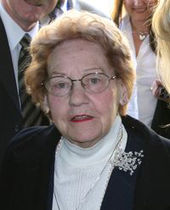- Croatian Spring
-
The Croatian Spring (Croatian: Hrvatsko proljeće, also called masovni pokret or MASPOK, for "mass movement") was a political movement from the early 1970s that called for greater rights for Croatia which was then part of Yugoslavia as well as democratic and economic reforms.
Contents
History
The movement was set in motion when a group of influential Croatian poets and linguists published a Declaration on the Status and Name of the Croatian Standard Language in 1967. After 1968 the patriotic goals of that document morphed into a generic Croatian movement for more rights for Croatia which received grassroots support, especially amongst many student organizations which actively started to voice their support for the cause.
Among the main demands were greater civil rights for Croatian citizens; the right to take pride in one's history was prominently featured. This irritated Tito's communist government which, though not banning nationalist feelings, did not parade them around, as wounds from the Second World War were still fresh.
Economical development
Some in the movement also voiced demands for the decentralization of the economy, which would have allowed the republic to keep more of the profits made from tourism within Croatia. According to some sources, as much as 50% of all foreign currency that entered Yugoslavia came through Croatia, but Croatia itself kept only 7% of it. An independent National Bank of Croatia would have allowed for a fairer distribution of profits. By waiving the right to use the federal bank of Yugoslavia, the republic would also have to waive its right to use the federal fund for underdeveloped regions. However, because Croatia was much wealthier than the other republics, with the exception of Slovenia, it used only 16.5% of the money from the federal solidarity fund between 1965 and 1970, while Serbia used 46.6% almost exclusively for its undeveloped autonomous region of Kosovo i Metohija which, for itself was a province with high level autonomy. Concerns were also raised about the monopoly of the Yugoslav Investment Bank and the Bank for Foreign Trade from Belgrade on all foreign investments and trade.
The Croatians also protested against general economic issues such as the increased economic emigration into Western Europe. They objected that the Yugoslav government did too little to curb such trends. Among the issues raised was the usual practice of Yugoslav People's Army sent people for mandatory military service into other republics rather than leaving them in the one they originated from.
Unification
There were also attempts to bring the notion of including Herzegovina into Croatia to the attention of the authorities (similar to the Banovina of Croatia that existed within the Kingdom of Yugoslavia from 1939 to 1941), but this was far from anything that the movement leaders were proposing. In fact, such red herrings were often used to denounce the demands related to decentralization and autonomy as expansionist and ultimately separatist.
The movement organized demonstrations in 1971 and thousands of Zagreb students publicly protested.
Political unrest
Three Croatian linguists, Stjepan Babić, Božidar Finka and Milan Moguš, published a spelling and grammar textbook in 1971 called Hrvatski pravopis (Croatian Orthography), rather than the accepted Srpskohrvatski (Serbo-Croatian). It was summarily banned. However, one copy survived and found its way to London where it was printed and published.
The Yugoslav leadership interpreted the whole affair as a restoration of Croatian nationalism, dismissed the movement as chauvinistic and had the police suppress the demonstrators. In 1971, Soviet Union leadership applied additional pressure on Josip Broz Tito directly by Leonid Brezhnev and indirectly by its ambassadors to Yugoslavia, to assert control of the Communist party within Yugoslavia, ostensibly adhering to the Brezhnev Doctrine.[1]
After the calls to the student strike, in December 1971 Tito persuaded to resign some unreliable, in his view, public figures like Savka Dabčević-Kučar, Miko Tripalo and Dragutin Haramija and make a sweep in Croatian communist party and local administration. Many student activists were detained and some were even sentenced to years of prison. Some estimate that up to two thousand people were criminally prosecuted for participation in these events. Among those arrested at this time were future president of Croatia Franjo Tuđman and dissident journalist Bruno Bušić. There were several other notable political prisoners in Croatia from this period.
Constitution
In 1974, a new federal constitution was ratified that gave more autonomy to the individual republics, thereby basically fulfilling the main goals of the 1971 movement.
Several student leaders from the Croatian Spring later emerged as influential political figures after the collapse of communism. Ivan Zvonimir-Čičak became the leader of the Croatian Helsinki Committee for Human Rights. Dražen Budiša became the leader of the Croatian Social Liberal Party. Savka Dabčević-Kučar, Miko Tripalo and Dragutin Haramija became founding members of the new Croatian People's Party.
The fourth edition of the Babić-Finka-Moguš Hrvatski pravopis is used today as a standard definition of the Croatian language.
References
- ^ Ivo Banac (20 November 2011). "Kako su Rusi lomili Tita i slomili Hrvatsku [How the Russians pressured Tito and broke Croatia]" (in Croatian). Večernji list. http://www.vecernji.hr/vijesti/kako-su-rusi-lomili-tita-slomili-hrvatsku-clanak-347999. Retrieved 20 November 2011.
Categories:- 20th century in Croatia
- Second Yugoslavia
Wikimedia Foundation. 2010.

